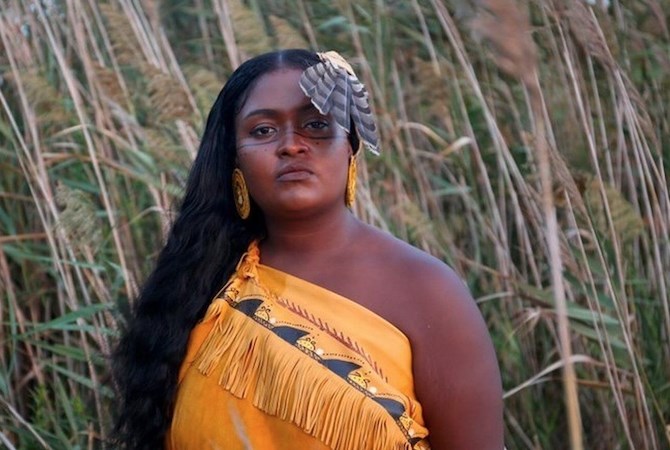
As a businesswoman, an entrepreneur and an activist, Chenae Bullock says, “All we’re doing is really upholding our sovereign and inherent right to step up and speak about the voiceless.”
Image Credit: Bryan Downey
June 15, 2021 - 7:00 PM
Indigenous representation is rising on social media platforms like TikTok and Instagram and in ad campaigns for companies like Sephora Canada, Nike, and RW&CO — and so is criticism about the nature of this representation.
For many, it’s meaningful to see Indigenous people reflected in ad campaigns, which are being used to draw attention to systemic racial inequities. For others, the lack of representation for Afro-Indigenous and darker-skinned Indigenous people speaks to anti-Blackness and colourism.
Mahlikah Awe:ri, who is Kanien’kéhà:ka and Mi’kmaw, points to a recent Sephora Canada campaign which features Inuk throat singer Shina Nova and Michelle Chubb, who is Cree. Sephora is a makeup company with 2,500 stores in 32 countries, according to the company’s website.
“There’s no Afro-Indigenous representation. There were no darker skin tones,” says Awe:ri, a self-described “artivist” for social change, a poet and an arts educator.
Awe:ri says the lack of equitable representation is especially disappointing following “a year of global uprising against social injustices.”
“It kind of reminds us that Afro-Indigenous kin are still not seen as Indigenous. We are ‘other,’ and yet Indigenous kin who have European ancestry are more readily accepted as Indigenous.
“This narrative tells us that proximity to whiteness is our standard of beauty.”
Anti-Blackness in Indigenous communities
A growing online conversation draws connections between the Sephora campaign and deep-seated anti-Blackness in Indigenous communities.
In response to the Sephora Canada campaign, Constanza Eliana organized a panel to discuss Sephora’s role in representation and anti-Blackness, which took place via Instagram on June 8. The panel included Awe:ri, Shanese Indoowaaboo Steele, Chenae Bullock, and Kamiyah Wolfeye.
“We felt left out,” says Chenae Bullock, who is Shinnecock, Montauk and African American, and refers to herself as “richly melanated.”
“We come in all different shades and the ones that are darker are always left out of being at the front or being noticed or acknowledged, and sometimes that’s in households,” Bullock says.
Bullock says the Sephora campaign is beautiful and includes Indigenous representation in a place where it always should have been, but that the company has “more homework to do on what diversity looks like in Indian country.”
For Sephora, it’s the first time they’ve recognized National Indigenous History Month.
“National Indigenous History Month is a time to learn about, appreciate and acknowledge the contributions Indigenous peoples have made in shaping the country we live in,” says the company’s website.
“There was knowledge and wisdom here before Canada existed and the world deserves to hear these diverse voices, strengths, and teachings.”
Bullock says she’s not “against” Sephora or those involved in putting the campaign together. Rather, she sees it as a missed opportunity.
“There is a story that they had an opportunity to create awareness about, and that is anti-Blackness in Indigenous communities.”
‘We need accountability. We need an apology’
Awe:ri says she is working to confirm a call with Sephora representatives about how to move forward. She says that the impacts of anti-Blackness, anti-Black racism and colourism are currently being shouldered by all Black-identified people, including Afro-Indigenous folks.
To cover the unpaid time it takes to educate people about the shortcomings of Sephora’s campaign, she’s created a PayPal account people can contribute to.
“We need accountability. We need an apology. We need folks to think about moving beyond solidarity statements and offering us tokenized opportunities.”
Awe:ri says she’s reached out using different means to try and engage directly with Sephora and the folks involved in this campaign to “come together in an Indigenous way.”
She also wants Sephora to commit to giving back to community.
“They benefit off of our identities and our culture, so if in fact our people are engaging with them in such campaigns, I want to know how they are giving back to the community.”
Bullock says Sephora needs to do some “deep dive work on their internal department.”
“There’s a whole community of people that are completely left out, but are still doing the work. So I think the internal work of really checking before you go and do the outreach … and holding those you’re consulting with accountable.”
Sarain Fox, the Anishinaabe founder of Land Back Studios, consulted on the Sephora Canada campaign and has been criticized for excluding Afro-Indigenous folks and Indigenous peoples with darker skin tones.
In an Instagram post and video, Fox says, “I’m working with Sephora Canada to navigate them towards engagement with Black-Indigenous communities and increased advocacy for all Indigenous people in this campaign and beyond.”
IndigiNews reached out to both Fox and Sephora Canada for interviews, and did not hear back before this article was published.
— This story was originally published by IndigiNews and The Discourse.
News from © iNFOnews, 2021